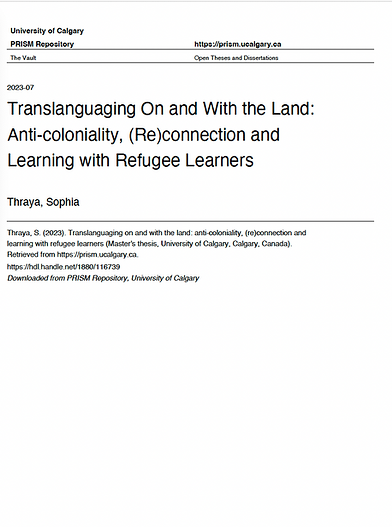SOPHIA THRAYA



Sophia Thraya
BA, BEd, MA, PhD Student in Learning Sciences
Educational Researcher & Alberta Certified Teacher
Werklund School of Education
University of Calgary
I am a second-year PhD student in Educational Research, specializing in Learning Sciences. As a researcher and educator, with specialized training working with historically marginalized learner populations, I have been continuously drawn to the transdisciplinary understandings of learning, equity and justice-oriented design approaches and pedagogical innovations that seek to deepen learning—central to the field of Learning Sciences. My ongoing and future research interests are situated in linguistic design toward equity and socio-environmental justice, leveraging lived and non-dominant knowledges in disciplinary spaces, with a specific focus on experiences of refugee children within learning spaces. With a strong conceptual grounding in translanguaging, I intentionally focus on thriving linguistic practices, relationality, and learning that transcends disciplinary silos and divides across languages, geopolitical locations, and species.

Land Acknowledgement
I acknowledge the privilege I hold as an immigrant settler living, working, playing, learning, and building relationships on and with this land, stewarded for generations by the Blackfoot people—the Siksika, Piikani, and Kainai First Nations—the Tsuut’ina First Nation, and the Stoney Nakoda, including the Chiniki, Bearspaw, and Goodstoney First Nations. Moh'kínstsis (Blackfoot), Wincheesh-pah (Nakoda), Otos-kwunee (Cree), Kootsisáw (Tsuut’ina), and Klincho-tinay-indihay (Slavey), now called the City of Calgary, is also home to the Métis Nation of Alberta (Districts 5 and 6).
Like many immigrant settler families, my grandparents came to Turtle Island from Lebanon, seeking greater possibilities for their future children. I carry with me the memories of my ancestral lands—the red soils, the towering pine nut trees, the olive orchards—and the pain of knowing these sacred places stewarded by my ancestors for generations are experiencing settler-colonial-driven ecocide, war, and land degradation. As Céline Semaan said, “As we survive, as we witness, and as we tell our stories, we weave between each of us a thread of solidarity.” This connection to my roots deeply informs my commitment to the lands where I now live and learn.
Here in Calgary, my work with Soil Camp has been driven by a profound love and respect for the land and all living beings that call the land and soil home, with a dedication to listening and meaningful reconciliation. As someone in the fields of education and research, I am committed to actively reflecting on Canada’s colonial histories past and present and engaging in actions toward reconciliation with, and the resurgence of, Indigenous communities.
This includes challenging the silencing of what I have termed “whole language hearts” in educational spaces and advocating for linguistic practices that honor the rich, diverse, embodied, inter-generational and interconnected ways of knowing and being connected to the land that have been sustained by Indigenous peoples for generations—central to my current work. I am dedicated to the daily renewal of my intentions and their transformation into meaningful actions toward reconciliation and eco-social justice.


Most Recent Publication
Awarded the ICLS Outstanding Short Paper Award
Takeuchi, M., Thraya, S., Mambo, T. (2024, June). Learning to See Beyond Anthropocentric Views on Bodies through Transdisciplinary Soil-Centered Pedagogy. Paper submitted for the International Society of the Learning Sciences Annual Meeting Buffalo, USA: International Society of the Learning Sciences.
Masters Thesis

Non-dominant multilingual learners, particularly those who have experienced forced displacement, are often met by educational environments where deficit discourses, monolingual norms and colonial silencing persist. This work examines how co-learners from refugee backgrounds in a multiyear land-based program, Soil Camp, have co-created spaces to challenge dominant norms, power dynamics and colonial histories. Alongside racialized facilitators, the children co-constructed environments that affirmed their multilingual identities and empowered agency within the teaching and learning spaces—a significant shift away from monolingual norms seen in formal schooling and dominant societal settings. Based on video- based interaction analyses, the findings illustrate the transformative power of translanguaging practices that validate multilingual identities and intergenerational knowledge systems, resulting in the co-creation of new social realities for learning, exhibited in moment-to-moment interactions. This work on earth-centered translanguaging practice seeks to connect to silenced intergenerational and new knowledge beyond named languages while attending to historicity and power, transcending human and more-than-human (MTH) divides. Children provided glimpses of their semiotic repertoires through highlighted child-led moments, which foraged new pathways for embodied representations of community, identity and MTH (re)connection. The result is translanguaging spaces where linguistic fluidity and embodied communicative practices sustain (re)connection on and with the land.






